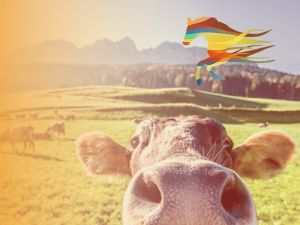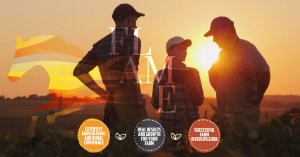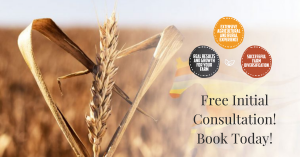

These days children are brought up with a phone in one hand, a Tablet in the other in front of a television. This is so worrying! What happened to knocking on each other’s doors and going to the park for a kick about.
Are we as a generation we becoming more and more separated from how our food is produced?
My answer to that would be yes. Well, apart from a small proportion.
This is where we as a rural community need to ensure the next generation understands you! How can we, as a sector, do this though?
The gap needs to be closed between farming and the general public. There are a few figureheads starting to do this; Abbie Reader (Dairy), Gareth Wyn Jones (Sheep), and of course Adam Henson, the country’s faces of farming. This is all well and good, but realistically this is only a handful of names and there are some 138,000 farmers in the UK. Couldn’t we all be doing our part as farmers, telling our stories, trying to educate those that are none the wiser, that wouldn’t know the difference between a cow and a sheep?
Yes, yes, we can, even if it’s the smallest of things.
The big discussion of today is farm diversification, it’s in conversation everywhere and this could be key in narrowing the gap and educating the next generation.
There are so many different ideas out there that could bring people onto the farm and educate them. There are even diversification projects that can be done off the farm, for those of us who don’t want to have the general public trudging around our farms.
Diversification projects also allow us as farmers to create a “buffer”. Where a lot of farms rely on seasonal incomes, there will be times of the year where there is very little, if any, income. Successful and effective diversification allows for a more consistent cash flow, creating a more stable business, not reliant on a single form of income.
So that’s the business bit out of the way, back to educating the next generation. There are so many different farm diversification options out there that could be implemented very easily.
 Bringing schools to the farm. This would involve linking up with a local school and allowing classes to take place on the farm. You yourself as a farmer could link up with teachers to teach classes involving general farm activities, which would be a great eye-opener for school children.
Bringing schools to the farm. This would involve linking up with a local school and allowing classes to take place on the farm. You yourself as a farmer could link up with teachers to teach classes involving general farm activities, which would be a great eye-opener for school children.
This could include educating the children about how their food is produced or explaining the impact of the environment on our countryside. Farm schools give children the opportunity to see first hand how food is produced and to gain a better understanding of the environment by seeing its impacts on farming.
This could be anything from a class a week to a day a month. Whatever you would feel comfortable doing.
Like farm schools, education centres allow children to come onto the farm and learn about the day to day goings-on, on the farm.
Although, by creating an education centre you would be in a position to offer packages to schools for a day, multiple days, even a week. Which could include accommodation and food.
Therefore, it opens up the farm experience to multiple schools and even older age groups. This can be particularly useful for children from urban or inner-city areas who may not otherwise have an opportunity to get close to farm animals or to experience the countryside.
The key here is to build relationships with key educational bodies as well as schools from areas of the country that will benefit from these experiences the most.
Farm experiences could range from going out to the school with some of the animals or products you produce and doing a talk. Or taking bookings for specific farm activities for example milking the cows, shearing sheep or even cider making for the over 18’s.
A great way of educating even if you don’t want visitors on the farm.
Here the key would be to build relationships with local schools and social groups and then expand into attracting larger groups from further afield once you have road-tested the experiences and are confident of the whole process. From managing the animals around children to consider how best to communicate with different age groups.
A new initiative where farmers are linked to schools to give weekly/monthly updates of the farm at home. Children can ask questions and see what the farmer is getting up to throughout the year.
This is a great option for those who are nervous about, but interested in farm schools or education centres. This gives you a chance to find out the type of questions asked by the children and to start building relationships with schools before going on to larger projects.
The Prince’s Farm Resilience Programme offers free business skills training to family farms across the UK. Although this may not be educating the general public, it allows you to educate other farmers.
It allows farmers to come onto the farm for specific courses to further their knowledge in specific sectors. They join a series of seven workshops, focusing on different business skills to maximise profitability and resilience. Topics include business planning, understanding accounts and budgeting, and a new environmental workshop.
So yes, we can help educate the general public about farming.
 You can do as much or as little as you want, but every little bit counts. Even if it’s talking about what you do on the farm to none farmers in the pub. Our industry just needs to pull together. we can do this and bring farming back to the forefront of the nation
You can do as much or as little as you want, but every little bit counts. Even if it’s talking about what you do on the farm to none farmers in the pub. Our industry just needs to pull together. we can do this and bring farming back to the forefront of the nation
And we are here to help you communicate your message to the general public. Flame marketing was set up to work like a bridge between the general public and the farm community.
We want to you have successful farm businesses and diversification projects, but we know that sometimes communicating with the public can be tough. That is where we come in to support you, from creating a professional website to promote your farm experiences to filming content about the farm to send to schools as an introduction to what you do.
If we work together, we can change how the British public views farming, we can make people understand. But we need to work together.